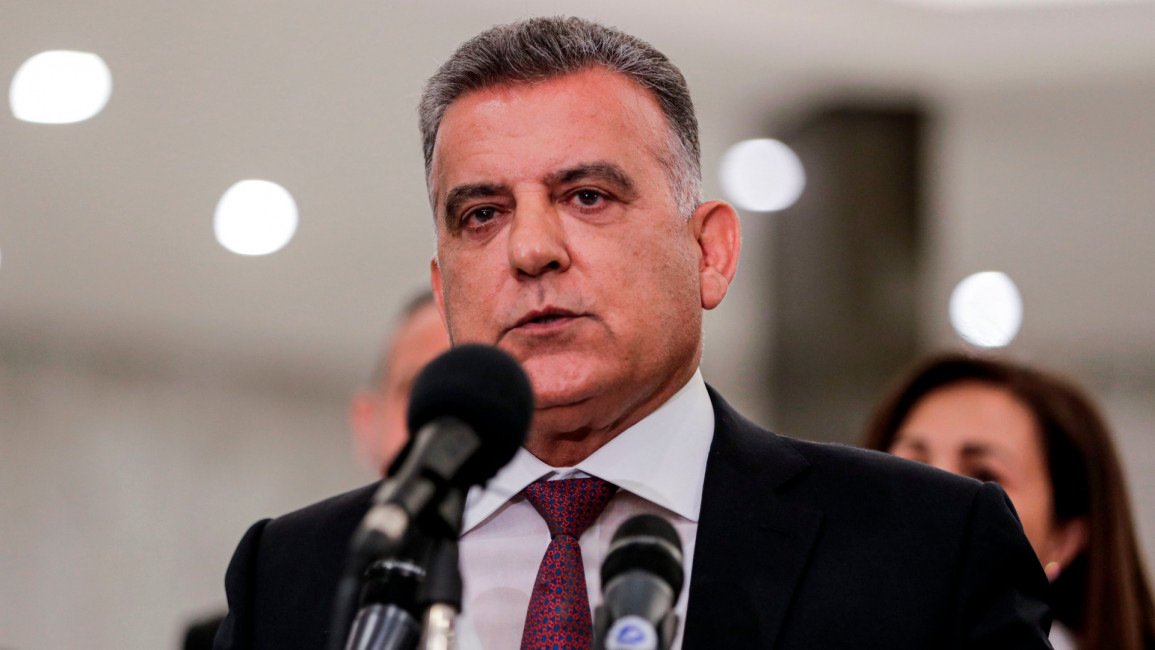Lebanon's security chief in Paris for talks with Macron aides as government formation talks stall
Lebanon's security chief in Paris for talks with Macron aides as government formation talks stall
Lebanon's security chief held talks with top Elysee aides in Paris as Beirut's government formation process - a key step to unlock international aid - nears two weeks without progress
2 min read
Lebanon's head of General Security Abbas Ibrahim was in France for talks [Getty]
The influential head of Lebanon's General Security apparatus, Abbas Ibrahim, returned to Beirut from Paris on Thursday for discussions with French officials over government formation and the reform programme initiated by President Emmanuel Macron, according to local media.
During his visit, Ibrahim met with top Elysee aides as well as external security chief Bernard Emié and Macron's diplomatic adviser Emmanuel Bonne. Emié and Bonne have also previously served as ambassadors to Lebanon.
Following his trip, the security chief held a meeting with Lebanon's President Michel Aoun at Beirut's Baabda palace, reportedly relaying to the head of state France's wish for Lebanon to hasten the formation of its technocratic crisis government.
Talks to form an emergency cabinet have stalled in recent days.
Local media speculated that Ibrahim had also reaffirmed Lebanon's opposition to US sanctions announced on Wednesday against two politicians close to Hezbollah.
Macron visited Beirut earlier this month, presenting Lebanon's political class with a checklist of urgent reforms that, when completed, would unlock a millions in international aid.
More than 250 aid was million euros ($295 million) was pledged by a host of countries in order to help Lebanon overcome its multiple crises, including extensive damage caused by the 4 August port disaster and an acute economic crisis.
Macron has visited Beirut twice since the explosion, which killed at least 180 people, injured some 6,000 and wrought destruction across the capital.
Mass protests against the political class erupted following the disaster, calling for the end to endemic corruption and mismanagement that has led to a paralysing financial crisis. The protests led to the resignation of the cabinet, who had only taken office in January.
Mustafa Adib, the prime minister-delegate, pledged at the end of August to form a crisis government within two weeks.
However, well into the second week, no cabinet has been selected.
Follow us on Facebook, Twitter and Instagram to stay connected
During his visit, Ibrahim met with top Elysee aides as well as external security chief Bernard Emié and Macron's diplomatic adviser Emmanuel Bonne. Emié and Bonne have also previously served as ambassadors to Lebanon.
Following his trip, the security chief held a meeting with Lebanon's President Michel Aoun at Beirut's Baabda palace, reportedly relaying to the head of state France's wish for Lebanon to hasten the formation of its technocratic crisis government.
Talks to form an emergency cabinet have stalled in recent days.
Local media speculated that Ibrahim had also reaffirmed Lebanon's opposition to US sanctions announced on Wednesday against two politicians close to Hezbollah.
Twitter Post
|
Macron visited Beirut earlier this month, presenting Lebanon's political class with a checklist of urgent reforms that, when completed, would unlock a millions in international aid.
More than 250 aid was million euros ($295 million) was pledged by a host of countries in order to help Lebanon overcome its multiple crises, including extensive damage caused by the 4 August port disaster and an acute economic crisis.
Macron has visited Beirut twice since the explosion, which killed at least 180 people, injured some 6,000 and wrought destruction across the capital.
Mass protests against the political class erupted following the disaster, calling for the end to endemic corruption and mismanagement that has led to a paralysing financial crisis. The protests led to the resignation of the cabinet, who had only taken office in January.
Mustafa Adib, the prime minister-delegate, pledged at the end of August to form a crisis government within two weeks.
However, well into the second week, no cabinet has been selected.
Follow us on Facebook, Twitter and Instagram to stay connected



